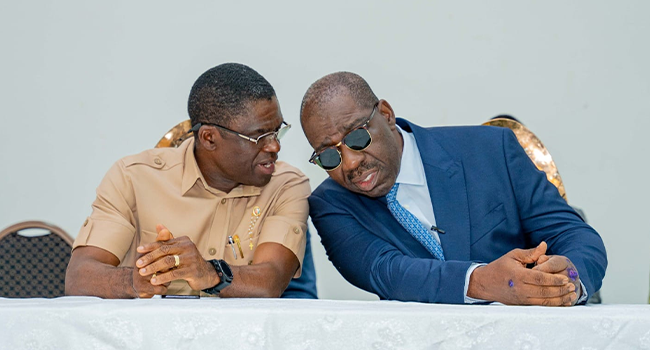Philip Shaibu, the reinstated Deputy Governor of Edo State, recently expressed his deep disappointment with how Governor Godwin Obaseki has treated him, despite his numerous sacrifices for the administration. Shaibu shared his grievances during a visit to the National Working Committee (NWC) of the ruling All Progressives Congress (APC) on Wednesday evening, where he spoke to journalists in Abuja.
Shaibu explained that he had given everything for Governor Obaseki’s success, only to be treated like an outcast. He highlighted his sacrifices, mentioning how he had given up many of his official entitlements and earnings to avoid any disagreements, particularly those related to money. Shaibu emphasized that his main focus was always the welfare of Edo State, putting the state’s interests above his personal and official benefits.
In response to reports that the state government had asked him to return 22 official vehicles, Shaibu clarified that almost all the vehicles in his convoy were his personal property. He pointed out that the only vehicle provided by the governor was a Jeep, which he received in the third year of their administration. The other vehicles, including a Land Cruiser, a Prado, and a Hilux, were either purchased by him personally or were from his previous roles as Majority Leader of the Edo State House of Assembly and a member of the House of Representatives.
When asked if he could ever forgive Obaseki, Shaibu reflected on human imperfection, saying that while no one is perfect except God, the commandment to love one’s neighbor as oneself should guide everyone’s actions. He expressed his disillusionment with the relationship, stating that he once believed in a perfect partnership but has since realized that no relationship is perfect.
Shaibu emphasized his strong commitment to the All Progressives Congress (APC) and the people of Edo State. He stressed that bringing the APC back to the Government House is a collective responsibility of all Edo people. According to Shaibu, Obaseki’s authoritarian control over the state can no longer be tolerated, and it is crucial for the people to unite against such governance to ensure the state’s progress.
Philip Shaibu’s revelations highlight a significant rift within the Edo State administration, pointing to deeper issues of trust and collaboration at the highest levels of government. As the political landscape in Edo continues to evolve, this discord will likely play an important role in shaping the future governance of the state. Shaibu’s dedication to the state’s welfare and his party’s success underscores a broader call for unity and effective leadership in addressing the challenges facing Edo State.
Shaibu’s account sheds light on the personal and political sacrifices made by leaders in their quest for effective governance. It also serves as a reminder of the complexities of political relationships and the need for mutual respect and understanding to achieve common go












